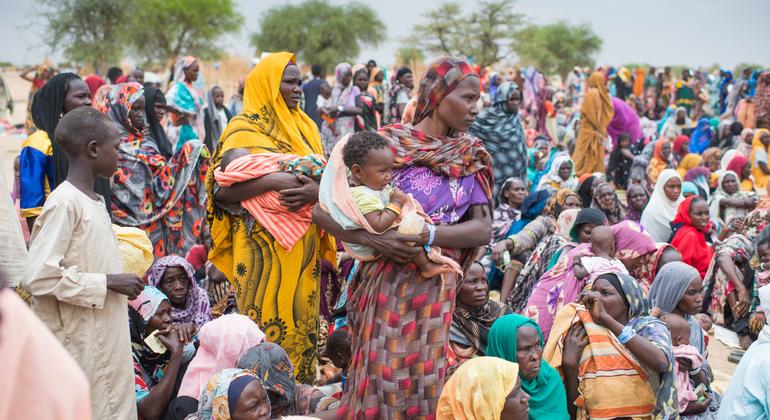The UN and partners launched a $445 million plan to ease the Sudan crisis

Updates were made in the preliminary draft of the Community Response Plan for Sudan, which was presented to donors in Geneva.
Funding will be covered immediate support in Chad, South Sudan, Egypt, Ethiopia and the Central African Republic. A more detailed plan will be launched next week.
More help is needed
Raouf Mazou, UNHCR’s Senior Assistant Director for Operations, pointed to the “tragic” humanitarian situation in Sudan since fighting between rival armed forces began three weeks ago, killing more than 500 people.
Distressing conditions include food, water and fuel shortages, as well as limited access to transport, communications and electricity. Access to health has also had a significant, ongoing insecurity prevent people from leaving dangerous areasand the price of basic goods has increased.
UNHCR is developing a contingency plan with partners for new arrivals to countries bordering Sudan. The crisis has displaced Sudanese citizens but refugees who are now returning to their cities, as well as other nationalities.
“UNHCR and partners have emergency teams in place and are assisting the authorities with technical support, registration of arrivals, security monitoring and mobilization to ensure emergency needs are met, ” Mr. Mazou said. “This is it just a start. More help is urgently needed.”
Refugees and return
The Community Response Plan was developed by UNHCR together with 134 partners, including sister UN agencies, national and international non-governmental organizations, and civil society organizations.
A preliminary estimate of 860,000 anticipates that some 580,000 people will be Sudanese; 235,000 refugees have already been hosted by Sudan, leaving in bad conditions, and 45,000 refugees of other countries. Most of the arrivals are expected to arrive Egypt and South Sudan.
The conflict has already displaced over 330,000 people in Sudan and forced more than 100,000 to leave. UNHCR has also launched a data portal that will update daily refugee and returnees to neighboring countries.
Every community is at risk
The Community Response Program will support host countries to ensure access to shelter, humanitarian assistance, and specialized services for the most vulnerable.
Like Sudan, most of the receiving countries are already hosts a large number of displaced peopleand services that have already been perennially underfunded.
Mr. Mazou stressed the need for greater support now, warning of potential negative consequences.
“We urgently need timely, new funding to respond to mounting needs,” he said. “The needs are greater, and the challenges are greater. If the problem persists, peace and stability in the entire region may be at risk.”
Thousands in Ethiopia border town
Meanwhile, over 12,000 people have arrived in the remote Ethiopian border town of Metema since the fighting began on 15 April, the UN migration agency, IOM, reported on Wednesday.
They include Sudanese, Ethiopian returnees and citizens from Turkey, Eritrea, Somalia, Kenya and more than 50 other countries.
Many were exhausted from the long and dangerous journey to safety.
IOM’s Displacement Tracking Matrix (DTM) is currently recording more than 1,000 daily arrivals in Metema. Many of these people entered Ethiopia without tools and possessions, making them vulnerable to harassment.
IOM is assisting the arrivalsincluding those from countries whose embassies have requested support for their citizens.
It’s almost enough 200 Kenyanssome of their students, on 200 Ugandans and more than 800 Somalis are among those who have helped so far.
A Tanzanian family was also able to receive medical treatment quickly and finally return home with the help of their embassy in Ethiopia’s capital, Addis Ababa.
Two midwives work at a UNFPA-supported hospital in Sudan. (file)
‘Pregnancies don’t stop’
Back in Sudan, brave midwives continue to bring new life into the world, amid heavy gunfire and insecurity.
“As supplies and services stagnate, pregnancies do not last,” the UN reproductive health agency, UNFPA, noted on Wednesday.
It is UNFPA employed some 90 social midwives that helps pregnant women to give birth safely, especially at home, in the capital Khartoum.
“We are work all day every day across three hospitals. For women and girls who have no means of transportation, we go to their homes to make sure they give birth safely,” said Insaf, a midwife currently working in Om Badda, a western district in the city.
A life-threatening situation
Some 61 percent of health facilities in Khartoum are closed, and only 16 percent are functioning normally, affecting millions.
Dozens of attacks on hospitals, health workers and ambulances, along with widespread looting of already scarce medical supplies, water, fuel, and electricity, are pushing the health sector to the brink of collapse, UNFPA said.
The situation can prove life threatening for 219,000 pregnant women and girls in Khartoum alone because they cannot access essential health services, such as antenatal care, or give birth to their children safely.
UNFPA emphasizes that access to midwives is the most important factor in stopping preventable maternal and newborn deaths. Some 24,000 women are expected to give birth in the coming weeks.
“We have it lack of materials in Khartoum, especially oxytocin and umbilical clips. Although operations are continuing for now, we are praying for more supplies to arrive soon,” said Jamila, a midwife working at a UNFPA-supported health facility.
Meanwhile, blood, oxygen and other medical needs, such as fuel for ambulances, are also running at risk.
Health care under fire
The World Health Organization (WHO) confirms further attacks on the health system, such as theft, access restrictions, violent attacks, and extortion of resources, the UN reported on Wednesday.
Together, 28 cases have been verifiedcausing eight deaths and 18 injuries among workers working in the sector.
The UN and its partners continue to deliver humanitarian aid to the people of Sudan, wherever and whenever possible.
Following a temporary pause, the World Food Program (WFP) resumed its rescue operations on Wednesday, and a first batch is underway to reach 22,000 people in Gedaref state.
Children caught in crossfire
The United Nations Children’s Fund (UNICEF) has expressed its ongoing concern for the boys and girls affected by the crisis. Some of them 190 children reported to have been killed and another 1,700 injured.
“The situation is in Sudan teetering towards disasterand children are increasingly caught in the crossfire,” Executive Director Catherine Russell said in a statement Thursday.
“For the sake of the Sudanese people, the violence must stop.”
Ms. Russell added that the attack on the humanitarian sector is affecting her agency’s work to deliver life-saving health, food, water and sanitation services to children across the country.
Aid workers have come under fire, while humanitarian supplies and supplies – including those belonging to UNICEF – have been looted or destroyed.
“UNICEF also called for it a long-term political solution to the crisis, so that the children of Sudan can grow up in a peaceful environment and look forward to a more hopeful future,” Ms. Russell said.










